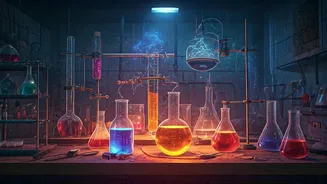Science Takes a Beating
Movies and television frequently bend or outright break the rules of science for dramatic effect, resulting in some truly memorable (and often inaccurate)
moments. One of the most common issues involves physics. Think about the countless explosions that occur in space, complete with sound effects – a complete impossibility, since sound needs a medium like air to travel. Similarly, the speed of light is often ignored; characters zip across galaxies in minutes, defying Einstein's theories. Biology often gets a makeover too. Genetic engineering is frequently depicted with exaggerated capabilities, and medical procedures are condensed and simplified for the sake of pacing and entertainment. These creative liberties aren’t always malicious, but they consistently offer viewers a chuckle or a chance to question the veracity of what they're seeing.
Physics Fiascos Unveiled
Physics is often the first casualty of Hollywood's need for spectacle. The presence of explosions in the vacuum of space, which is devoid of the air needed for sound to travel, has become a standard trope. Furthermore, the laws of gravity are frequently ignored. Characters leap impossible distances, and objects float in a manner that defies Newtonian physics. Travel through space presents another area of concern. The speed of light, which presents a significant barrier to interstellar travel, is regularly disregarded. Spaceships travel between galaxies in what would, in reality, be an impossibly short amount of time. Even within Earth's atmosphere, filmmakers employ various tricks. For example, the trajectory of projectiles and the effects of air resistance are frequently oversimplified to create the illusion of drama, though it's all in good fun and part of the storytelling.
Biology's Misinterpretations
Biology, like physics, suffers significantly in the name of entertainment. Genetic engineering frequently appears in the guise of near-instant transformations or the creation of creatures with abilities exceeding the boundaries of reality. Medical procedures are typically simplified, leading to plot resolutions that would be impossible in a genuine medical setting. Concepts like cloning and DNA manipulation are often dramatized, producing visually impressive effects, which are not reflective of the intricate procedures that would actually be involved. The speed with which complex biological processes unfold onscreen, whether it's disease progression or the effects of a drug, is often dramatically sped up. The emphasis on visual spectacle and dramatic intensity regularly trumps the need for scientific accuracy, offering audiences a more digestible and entertaining narrative.
Chemistry's Creative License
Chemical reactions in movies can be rather inconsistent. Filmmakers often portray highly complex reactions as simple, instantaneous events. For example, mixing two substances might create a massive explosion, even when those chemicals would realistically require controlled conditions. The effects of poisons are often exaggerated or presented with unrealistic results. A character might succumb within seconds to a toxin that, in the real world, would take hours or days to take effect. Another commonly overused trope is the depiction of acids and bases. They're usually depicted in a way that is far more dramatic than their actual properties would suggest. These oversimplifications and dramatic liberties often contribute to the excitement of a scene. However, they sometimes sacrifice accuracy for the purpose of heightened visual effects or streamlined storytelling.
Technology's Future Fantasies
Technology is a major subject of speculation in movies, often offering exaggerated glimpses into the future. Films frequently feature advanced devices and gadgets that seem to bend the laws of physics or defy the limitations of known technology. Artificial intelligence often takes on human-like characteristics and capabilities far beyond what is currently achievable. The speed at which complex technologies develop and become integrated into the world is usually significantly accelerated, allowing storylines to advance quickly. Another common feature is the concept of ubiquitous and seamless connectivity, where characters can access vast amounts of information and communicate with anyone, anywhere, with ease. While these visions serve to expand the imagination, they often offer a skewed version of what technological advancements are capable of.
Exaggeration's Allure
The overestimation of scientific capabilities serves a clear purpose in entertainment: it amplifies the drama. This heightened drama engages audiences and often intensifies the emotional impact of a scene. The exaggeration of scientific concepts also allows filmmakers to explore themes that would be too complex or dull to convey accurately. Complex scientific ideas are presented in visually appealing ways, and that improves narrative accessibility. Furthermore, the deliberate inaccuracies allow for enhanced action sequences, greater suspense, and more memorable plot twists. This emphasis on theatricality is a calculated choice that filmmakers make to create a more engaging cinematic experience. The goal is to entertain, to make an emotional connection, and not to deliver a scientific lesson.
Comedy's Scientific Wit
Sometimes, the mistakes themselves become the punchline. Comedies especially capitalize on the absurdities of scientific inaccuracies. Characters can be seen behaving in scientifically impossible ways, for example, surviving lethal situations or making fantastical leaps of faith. These scenarios elicit laughter because they exploit the audience's knowledge of the real world. Many films use over-the-top inventions that are clearly designed to fail, and the consequences of those failures become the source of humour. Some films include scenes where the characters themselves acknowledge the inaccuracies, creating a sense of self-awareness. The humor is often derived from the unexpected consequences of ignoring the laws of science. This blend of scientific blunders and comic timing allows audiences to be entertained while simultaneously recognizing the impossibility of the depicted events.












